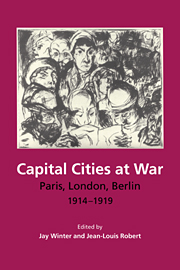Book contents
- Frontmatter
- Contents
- Note on joint authorship
- List of figures
- List of tables
- Part 1 Premises
- Part 2 The Social Relations of Sacrifice
- Part 3 The social relations of labour
- 5 The transition to war in 1914
- 6 The labour market and industrial mobilization, 1915-1917
- 7 The transition to peace, 1918-1919
- Part 4 The social relations of incomes
- Part 5 The social relations of consumption
- Part 6 Urban demography in wartime
- Part 7 Towards a social history of capital cities at war
- Statistical appendix and tables
- Bibliography
- Index
7 - The transition to peace, 1918-1919
Published online by Cambridge University Press: 15 December 2009
- Frontmatter
- Contents
- Note on joint authorship
- List of figures
- List of tables
- Part 1 Premises
- Part 2 The Social Relations of Sacrifice
- Part 3 The social relations of labour
- 5 The transition to war in 1914
- 6 The labour market and industrial mobilization, 1915-1917
- 7 The transition to peace, 1918-1919
- Part 4 The social relations of incomes
- Part 5 The social relations of consumption
- Part 6 Urban demography in wartime
- Part 7 Towards a social history of capital cities at war
- Statistical appendix and tables
- Bibliography
- Index
Summary
The end of hostilities and the demobilization of Europe's armies after November 1918 inaugurated a period of economic transition that was just as dramatic as the crisis of mobilization in 1914-1915. Nevertheless, the changes that had taken place in Paris, London, and Berlin in over four years of total war ensured that the transition to peace would not bear any simple resemblance to mobilization in reverse, that is, a return to the pre-war situation. All three cities had been transformed by the demands of the war economy, albeit to varying degrees. Older patterns of employment had been disrupted, new industries had been developed, and the state had intervened in the economic life of each city in unprecedented ways. This chapter will explore the crises of demobilization in each city in order to determine the extent to which the dislocation caused by the war continued into the immediate post-war period.
In assessing the changes which accompanied the demobilization, some historians have emphasized the quick abandonment of government control during the difficult years 1919 and 1920, and pointed to the apparent victory of free-market policies in the post-war period, at the expense of organized labour. Other historians have questioned the view which posits a stark opposition between wartime economic interventionism and post-war laissez-faire in Western Europe, and noted instead several significant arenas of continuity between the period before and immediately following the Armistice of 11 November 1918.
- Type
- Chapter
- Information
- Capital Cities at WarParis, London, Berlin 1914–1919, pp. 196 - 226Publisher: Cambridge University PressPrint publication year: 1997



